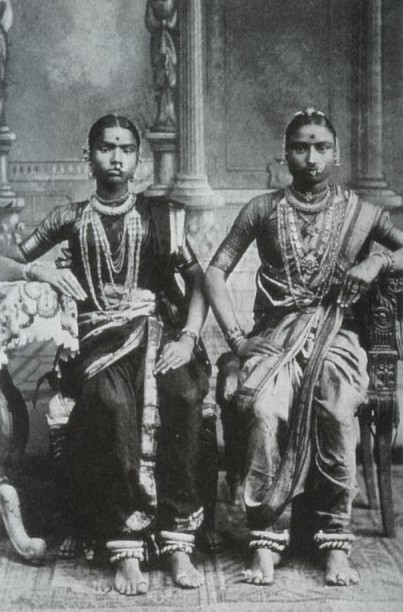 |
| Devadasis |
In Hinduism, the devadasi tradition is a religious tradition in which girls are "married" and dedicated to a deity or to a temple. Originally, in addition to this and taking care of the temple and performing rituals, these women learned and practiced Bharatanatyam, Odissi and other classical Indian artistic traditions and enjoyed a high social status. The devadasi system was outlawed in all of India in 1988.
During British rule, kings who were the patrons of temples and temple arts became powerless. As a result, devadasis were left without their traditional means of support and patronage. Colonial views on devadasis are hotly disputed by several groups and organizations in India and by western academics.
Devadasi System

Traditionally the young devadasi underwent a ceremony of dedication to the deity of the local temple which resembled in its ritual structure the upper caste Tamil marriage ceremony. Following this ceremony, she was set apart from her non-dedicated sisters in that she was not permitted to marry and her celibate or unmarried status was legal in customary terms. Significantly, however she was not prevented from leading a normal life involving sex with individuals of her choice and childbearing. The very rituals which marked and confirmed her incorporation into temple service also committed her to the rigorous emotional and physical training in the classical dance, her hereditary profession. In addition, they served to advertise in a perfectly open and public manner her availability for sexual liaisons with a proper patron and protector. Very often in fact, the costs of temple dedication were met by a man who wished thus to anticipate a particular devadasi's favours after she had attained puberty. It was crucially a women's 'dedicated' status which made it a symbol of social prestige and privilege to maintain her.
Source
The Reason for the Prevalence of the Devadasi system.
In the days of yore ,devadasis were trained in the performing arts like Bharatnatyam and they were looked after by the temple authorities and rich patrons.courtesans who could live a life of comfort and complishment.When they became older they were not abandoned as they still had their art which they could teach younger girls.However with the passage of time .reformers sought to abolish this practice nad successfully imposed legal restriction which were supposed to annihilate it completely.
Unfortunately , things did not turn out as expected.People felt that religious sanction exonerated them from legal offences and continue to practice it secretly.Small temples have become the preferred venues for this practice.In this day and age , the devadasi is not an accomplished courtesan but a prstitute with no means of looking after herself.Her life is one of abject poverty , sexual exploitation , constant degradation and ultimate abandonment.
Source: Article in "Women era"





































































